The Bull Inn and Baddaford Farm, Devon
''There’s no point in having an ethical business that’s just an indulgence of the rich.'' Part two of my interview with Geetie Singh-Watson
If you’ve not read my first piece about Geetie and Totnes Market, find it here.
It’s a gloriously warm spring morning and people are sitting outside The Bull Inn in the heart of Totnes, basking in the sunshine.
Geetie opened The Bull Inn in 2019.
In the dining room above the kitchen’s serving hatch is a blackboard with No Bull rules to trade by, dine by and work by. I remember something very similar at The Duke of Cambridge in Islington, Geetie’s first organic pub.
They only buy organic or wild, genuinely seasonal ingredients that aren’t air-freighted or grown in heated greenhouses and are field grown. Food waste is sent to the local Langage Farm, where it is processed in an anaerobic digestion facility to produce electricity, heat and fertilisers. This facility powers the farm, creating the only carbon neutral dairy in the country.
Prepackaged snacks, cling film and bottled water are avoided. All suppliers are vetted and must be accredited or certified by a recognised body. They support sustainable fishing by favouring method over species. This means ensuring the use of small boats (under 10m), no dredging, no beam trawlers, and promoting bivalves as a sustainable choice.
There are jars of fruits and vegetables in the process of being turned into pickles and ferments. Cognac from bottles of macerating pears is being used in cocktails. The pears were destined for a trifle which I can confirm was delicious.
Geetie and I are back from the market; she’ll return later to pick up all the treasures she’s bought.
Yours is one of the rare restaurants where I can open a menu and know that I won’t need to ask any questions. I can be confident of the sourcing. Very few places live up to your standards. Why do you think that is?
It fascinates me. It’s a whole different philosophy; there are other businesses that have it, but it's quite unusual, the radical ethical businesses that think about humanity, and think about trade and business, about its relevance to society, the planet and the environment. When you trade and operate a business like that, you end up with an incredibly dedicated and committed team because you're not just working for someone else's profit. You're working for a purpose in society and the environment.
You get very different types of people coming to work for you. More than that, you get a much bigger pool to pick from, and you pick more intuitive people. That's if you start with that philosophy of who are my people, and how are they going to be committed to making this business function. Then you can move into doing something quite radical with your business because they're motivated and excited by what they're doing. It takes a lot more people management, a lot of people time. We pay higher wages with more managers than most restaurants have.
We pay five to six times more than everyone else for our dry store. Meat is four times. Fish is actually probably fairly similar to the rest of the market. Veg is more complicated because I have a direct relationship with a rather fine veg grower, so we get some good stuff fairly cheaply.
The reason why we are full all the time, get endless press, have loyal staff, is the purpose behind the business, and that allows us to do something quite radical and quite different. When you're running any average business, and you're just focused on how cheap you can buy in and how high you can sell, it's like you kill the drive of the humans that create the business. With a ‘we can save money here, and we can make more’, they've lost the motivation, it's not there, it's not real, it's not true. That's the only reason that I can come up with, that we make money in the same way that any other restaurant does, despite the fact that we're paying so much more for everything.
It really baffles me how these restaurants are running the same margin as us, when their cost of ingredients is a quarter of ours. They should be doing four times the profit. But they don’t.
If you're only driven by the bottom line, you miss so much of the deep soul of trade, the way business has been protected purely for the shareholder rather than for the other vested interest in the business; the suppliers, the employees, the owners.
Why aren't there more models like yours?
I suppose a good comparison is the difference between conventional farming and organic farming. When you're a conventional farmer, there are always millions of shortcuts. When you're an organic farmer, you have to go into the deep nuance of why that creature's there, what else can we do to help and guide it and support the ladybirds eating the green flies. What can we do to make this happen to support that system? So it takes great complexity, and that's the same with running a business like this.
To be able to buy whole animals, and use the entire carcass from beginning to end, the flexibility that has to be built into the menu is quite complex. So you need to build a dish that can change mid service according to the cut of meat. You may only have small portions of something. A friend of mine came in the other day and had offal, and she said why do you not have more offal on the menu? And I said well creatures have limited offal, you know.
The people who work with me are stimulated, they have mastery, they're learning a new skill, they have purpose, they feel they're giving value to society, they have autonomy, they get to make their own decisions, but there's great accountability; we monitor very closely our reviews, our margins, we stock take every week.
There’s a sense of being a whole part of this cog that they're genuinely contributing to and have autonomy over. So you end up with committing people towards the right direction. Or you can just screw your people and treat them like they're a commodity. And what is left in society if we do that? That makes Jeff Bezos a very rich man, but it leaves the rest of society utterly fucked.
I'm not interested in trying like that. I wouldn't do it. I couldn't do it. I'm interested in being part of society. If my team are happy at work, you go home happier.
And then you'll have happier children, happier partners, happier families. People you communicate with will be happier. It's so obvious.

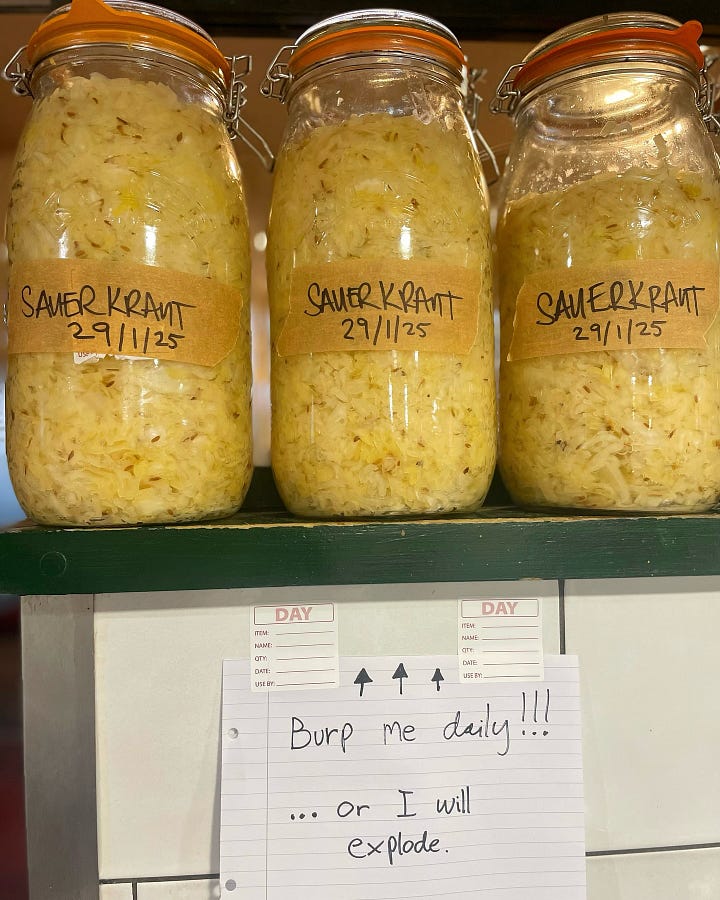
Are you affected by The Hungry Gap when very little is growing in the UK?
I’ve always managed it, because I’ve always bought seasonally. It’s very different on a restaurant menu because the chefs are so skilled. You don’t notice that aubergines are missing because chef has made something beautiful, maybe out of kale, mushrooms and beans. There’s always something they can create, using our wonderful preserves for example. We have to have a changing menu.
Does it make a difference that you own The Bull, whilst many restaurants are paying high rents?
Absolutely not. This is very important that the business is viable, so The Bull pays a proper market rent. Every way we operate is standard trade market practices. So our margins are the same on food and drink. Our wage percentage is probably higher and our profits are healthy. The only difference is we’d never hit any cash flow issues because I could fund anything we needed to do; but I wouldn’t fund just anything, it’s got to be a viable business. There’s no point in having an ethical business that’s just an indulgence of the rich. It’s pointless. I’m trying to prove that a business can be ethical and competitive in the market.
We were talking earlier about food heroes and Vandana Shiva just popped into my head. She was the eco-activist I remember first saying that food is not a commodity.
Yes. Absolutely. But I also think that business has such a social responsibility, and the businesses that act out that behaviour demonstrate such a beautiful impact. Why the hell is this not built into our structure? When I first opened my first business, I read every detail of everything. I read the articles and associations, which is the contract in a limited company that puts the shareholders before anything else, which is a standard trade. I was quite shocked by it, and I went to the lawyer and said I don't like this, it isn’t how I want to run the business. And he said you've got no choice. That's it.
That was the enforced market, this is how you behave if you become a limited company. There was no option. I had to agree to that. And then B Corps happened, which basically undermines that.
A whole movement that's saying business can behave differently. There's nothing, other than gas and probably a lot of our white goods, that we can't buy ethically.
We can literally name the stuff that is unethical in this business. Gas comes from Ecotricity. It's as best as we can get, but it's still an issue. But that is a sea change from when I opened The Duke thirty years ago. We literally had no mixers because there was no ethical mixer to buy. And now, there's a massive range.
I still remember you telling me that customers moaned at you at The Duke of Cambridge because you weren't stocking Coke. Have things moved on from that?
Massively. And they moved on quite quickly from that.
So to begin with, it was gin and plum juice because we couldn't do tonic. It demonstrates that the appetite is there for ethical artisan, human led food that isn't corporate led. But the market won't allow it to expand beyond that.
And one of the philosophies I have here, occasionally people will say to me, we are not supporting feeding the poor, and that isn't what I'm doing here. What I am trying to do here is educate the one to ten percent, the rich top who are doing the damage, to change their behaviour because we're the ones who carry the responsibility to spend every penny that we've got in the correct way. If we all bought organic mattresses and organic linen, it would have a sea change on the cotton and waste industry. It's our jobs to change our behaviour So I do lecture hard here, as hard as I can. On the other hand people are coming here to get away from it all, forget and chill.
So you have to do it in a warm and balanced and, inspiring way. Hopefully, there was a sign in your bedroom telling you about what we do.
There's little signs with important messages; energy saving is essential; don't fill the kettle up and if you open the window, turn the radiator off. It's sensible things your mum or dad might say.
Do you think you're preaching to the converted here?
I don't actually, because the shocking thing about the top one-ten percent is that they don't change their behaviour. We do to a certain extent, but I'm amazed at how many deep environmentalists I meet, I'm looking at what they're wearing, and thinking, so you don't apply it to your clothes. I want to lecture people. I have to really hold back. I do get very cross with people sometimes, and just say it's not good enough. You're too wealthy to be doing this.
If you can’t afford it, if there are circumstances where you can't, that's completely fair enough, and there should be no guilt on you for that. That's not your fault. That's legislation.
Tell me what you're most proud of.
The people. Watching them grow into the philosophy and be willing to take it on board and apply it, and then come up with stuff that I don't necessarily come up with which I love. I love when they drive and push me, there's all sorts of things that they push through here.
This is a brilliant example that came from one of the managers here, who's been one of the people that's been slightly harder to bring on the journey. I keep having to remind, don't buy what we don’t need.
You wait. We do not buy shit and throw it away. Longevity, we spend proper money on something that lasts. I cannot find an ethical brand of parasol for outside. I can't find anyone who's promised they'll repair, they’re recycled plastic whatever. So we've been going round and round and he just said, why do we need them?
And I was like you're right. We don't. They're under trees and it's much better; don't do it in the first place and that's your thinking. I thought you're getting it, you're really really getting it. This is great.
That's the thing I'm most proud of.
What did winning the sustainable restaurant award mean to you?
The Estrella one? That was fab. So often we are put out on this limb as this hippie place, and I want to be in the mainstream, and demonstrate that we’re not different; the whole point is that you can come in here, and not even notice that we're organic.
I've always operated that philosophy from the beginning. It's really important. To win in those kind of awards is absolutely thrilling. I have been to awards where I literally get dismissed, because I'm an organic pub in Totnes, And the amount of times people say to me, well it's obvious in Totnes, but they say the same in London, in Nottingham. It's obvious everywhere that works.
I think a lot about the right to food. How do we make sustainable food part of the diet for everyone? About food being a human right, not commodity, which we were talking about earlier. If people will pay the cost of real food in restaurants. And there are never any real changes because politicians, big businesses, call the shots.
If the price is more expensive, how can it include the majority of the population.
Business and trade and our behaviour. It's business that's controlling government over food, and that's what's really terrifying, and they're not prepared stand up to them. There was a rumour that when Blair and Brown got in pre-election, they were going to curb the supermarkets.
It was in the manifesto. They had a meeting with Sainsbury's Tesco, you know, the big supermarkets, and it was all dropped, and it was never discussed again. So what happens in those places? I have no idea. It's very disturbing, but I think it is important that we remind ourselves that it's business, it's a controlling policy from that point of view. And that takes a sea change in how we operate.
As for access to quality ingredients for everybody to be able to eat a proper healthy balanced diet. First of all we have to deal with the cost of accommodation, that's our problem in this country, and we can't expect people to spend more money on food when they can barely afford how they live. So if that's dealt with, we can up how much we're spending on food; everybody wants to. Nobody wants to eat shit, and everybody wants to be able to cook, and a lot of people don't have access to cooking facilities.
So until we deal with how we actually live, that you have a decent home, it's taken off the table that you're worried about whether or not you can afford it. Do you have a kitchen table and something you can cook on. It doesn't have to be a huge oven. It could just be an air fryer and a hot plate. Until then we'll be stuck in this insane, food poverty gap, which is horrific.
Ultimately, it comes down to controlling the supermarkets. And until they start telling the truth, stop pushing ultra processed food on everyone, it’s just not going to happen, and then that's down to government legislation. The truth is probably the most fundamental aspect of the issues that we have in the food industry.
When I first opened the Duke in 1998, weights and measures came in, trading standards came in; prove your alcohol levels, prove that you're pouring properly. But most of all, prove it's organic, prove it's fair trade, and that used to happen at least once a year, if not twice a year, then nothing for fifteen years, absolutely nothing, no weights and measures, no trading standards, no one questions. So you can lie wherever you want, and no one's holding you to account, because the funding was pretty much demolished. What the Tory government did is create a free market with absolutely no boundaries and no accountability for the claims we're making. So we're fucked really, aren't we.
If a supermarket can mislead customers about whether or not these chickens actually were raised on that beautiful farm they're pretending they come from…
Supermarkets need to be held accountable. If the truth was told people would make different choices. But how are we supposed to navigate this bullshit?
It's my big problem with regenerative farming. It's a nothing statement that has very little basis, and the citizen consumer has no chance of navigating exactly what they're buying. It's really dangerous.
I’m quoting from an article from the MAD digest in July last year; when they asked the question; Can a restaurant really do well and do good at the same time?
Writer and restaurateur Mark Bittman said “I wanted to see if I could put together a restaurant that did everything right,” he explained. “Source great food from great farms, and treat workers up and down the food chain right. Pay a living wage. Cook really good food. And make it accessible to everybody.”
It’s that last point in particular that drives him. Because he believes passionately that nutritious food should be a right, just like public education, Bittman designed his values-driven restaurant to operate on a sliding scale, with those who can afford to pay more doing so.’’
Can you see that sliding scale model working?
I can. I couldn't apply it here because our profit margin is so precarious. But I have looked at setting up other models that could be based on that. I am very interested in all the different ways that business can operate. I'm fascinated in the four day week. I'll just keep pondering on that for as long as I can, and could it apply to a business like this. It would be absolutely amazing. But I’m not sure it suits me.
You're very grassroots driven, with lots of ideas. So what's next?
Our next really passionate and exciting project is around training hospitality to be sustainable because there's very little happening around it. It's shocking. And as we put the feelers out about this course we'll be starting this year, the excitement around it is absolutely extraordinary. But the main aspect of it is, we're really interested in focusing on trying to link farmers and hospitality together, because retail's very clearly let it down, and prove that it can work and operate.
This is our mission for the next few years, to try and teach hospitality, how to trade directly with farmers. Lots of people talk about it and very few people have real life experience of it, and we think we can actually reeducate that. So at the Oxford Real Farming Conference next year, we're going to be doing a session on it, farm to hospitality direct. Retail's proved incompetent at trading with farmers.
Hospitality continually populates its menus with references to direct farm buying. So they know really well that that’s the food people want. So let's make it a reality, and let's teach them both how to do it. Farmers are scared of approaching restaurants, just as restaurants are of trying to work out how to trade with a farmer. So between the two, we can we can build the structure and help that happen.
I hope you can do that because I tried many times to pair restaurants up with farmers. Farmers would say, they don't pay or they only pay every six months, or they only want the prime cuts. And the restaurant says, they can’t supply enough, or they need to deliver on a specific day only. Sometimes I’d manage to get a specials on the menu but it wouldn’t last.
Geetie agrees; it's a big retraining.
Chefs and restaurateurs, particularly the smaller independents, are really quite passionate about working directly with farmers, and it's quite exciting. There's so many of us small independents, and we have the capacity to communicate directly with a small grower and work with them with flexibility, in a way that is very hard for retail. So in a shop, you're expected to have your standard tomatoes, potatoes, whatever. In a restaurant, it doesn't matter because we can be operating a menu that's got virtually no greens left on it because of the time of year, but you wouldn't notice as a customer, because the chef's a skilled cook; you come out for a treat and, you know, all those things. So our very exciting next project is to try and really influence the whole restaurant industry.
‘Tourists who can’t reverse shouldn’t bring their car to Devon.’ Geetie announces. I’m in the car with her, on our way to Baddaford Farm a few miles north of Totnes, where she and Guy live. Only a couple of days before, my friend Katrina had amused me by the phrase ‘Devon Scratchers.’ Local people don’t mind getting their cars scratched. Tourists drive in the middle of the lanes to avoid getting their cars damaged. Geetie is very much a local.
She’s obviously very proud of the work they are putting into building a community of like minded souls on the 154 acre Baddaford Collective.
The organic farm supplies the pub with produce. Guy and his team grow fruit and vegetables here for Riverford and The Bull Inn. 80 acres are given over to growing perennials which reduce ploughing and protects the soil. Around 50% of the produce served in the pub is grown on the estate, with a large part of that coming from a member of the collective.
As we walk around the units that house the businesses on the estate, Geetie and Guys’ generosity, thoughtfulness, determination and commitment is clear. Much of the site is on slopes making it a challenging environment for farming. She points out the fields of artichokes, Guys favourite vegetable, and the walnut tree plantation on the horizon. Considering the nut harvest leads to the subject of pests. We'd both love to see more grey squirrels end up on restaurant menus.
There are strawberry beds, poly tunnels with early spring crops growing and a bed of plants used for dyes by Sophie, one of the collective. As we walk around Geetie picks up pieces of rogue litter and plastic including plastic tree bands; she’s none too happy to see these.
Touring a beautiful old barn in the process of being salvaged and rescued, the site manager talks about the barn owl boxes in the upper corners of the walls whilst Geetie questions the provenance of some of the materials. The project is clearly going to be carried out the way she wants.
Cattle and sheep graze on the estate, and in addition to the families of barn owls, the farm is home to deer, hares, kestrels, skylarks, and frogs in the reservoirs.
The businesses based here are small scale ethical and organic land based. Incredible Vegetables, focus on perennial plants and seeds. They’re so popular you have to be quick to buy their inspiring range. It’s worth joining their email list for notifications. Vital Seeds grow and sell open pollinated, organic seeds.
Green Ginger Organics grow fruit and vegetables, supplying The Bull with produce.
Teas from Red Earth Herbs are in The Bull Inns’ bedrooms and on the cocktail menu in the dining room. As we’re talking to owner Sophie of Pigment Plant Dyes and admiring her work, Sophie mentions that she needs onion skins for dying. ‘We’ve got loads at The Bull I can give you’ Geetie exclaims. ‘That’s a perfect example of reciprocal exchange.’ She looks very satisfied.
A few days earlier as Geetie, Caroline and I were leaving The Bull after supper, we stopped by one of the wall decorations; Geetie remarked that when she first opened, she was given lots of bulls. This one, we all agree is female. Definitely no bull.
The Organic Bull Inn, Totnes. Restaurant and rooms.
If you've liked reading about Geetie please do click on the heart to like this post.
To support my writing…
Coffee or tea would be lovely, thank you.
I’m overjoyed if you can subscribe. If you can afford to, being a paid subscriber keeps this Substack going.

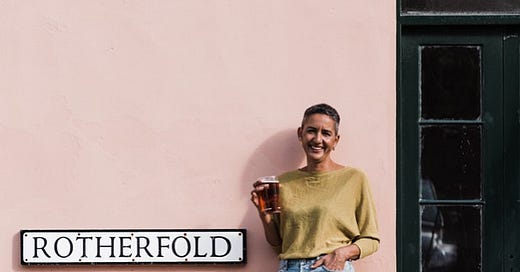




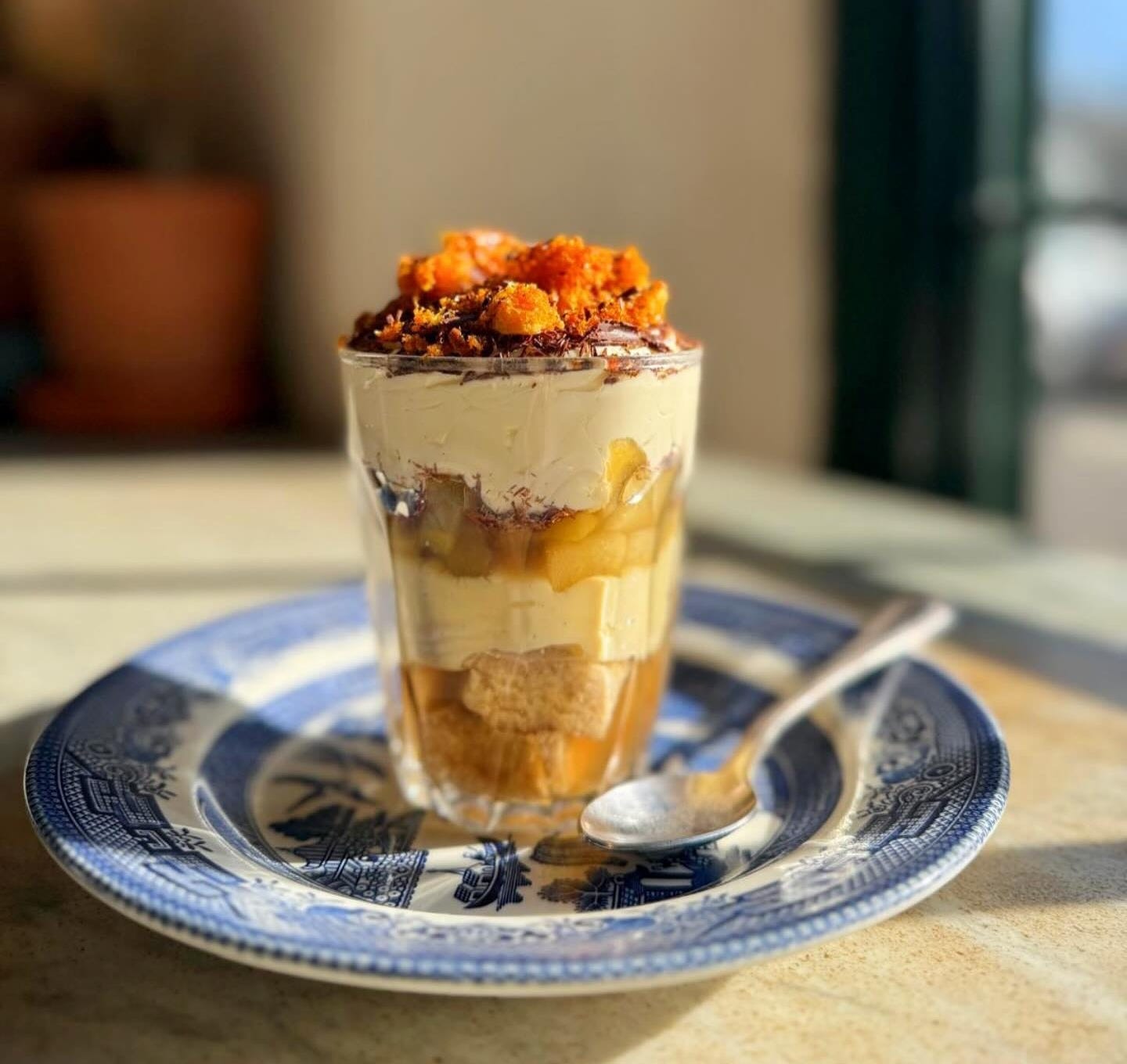
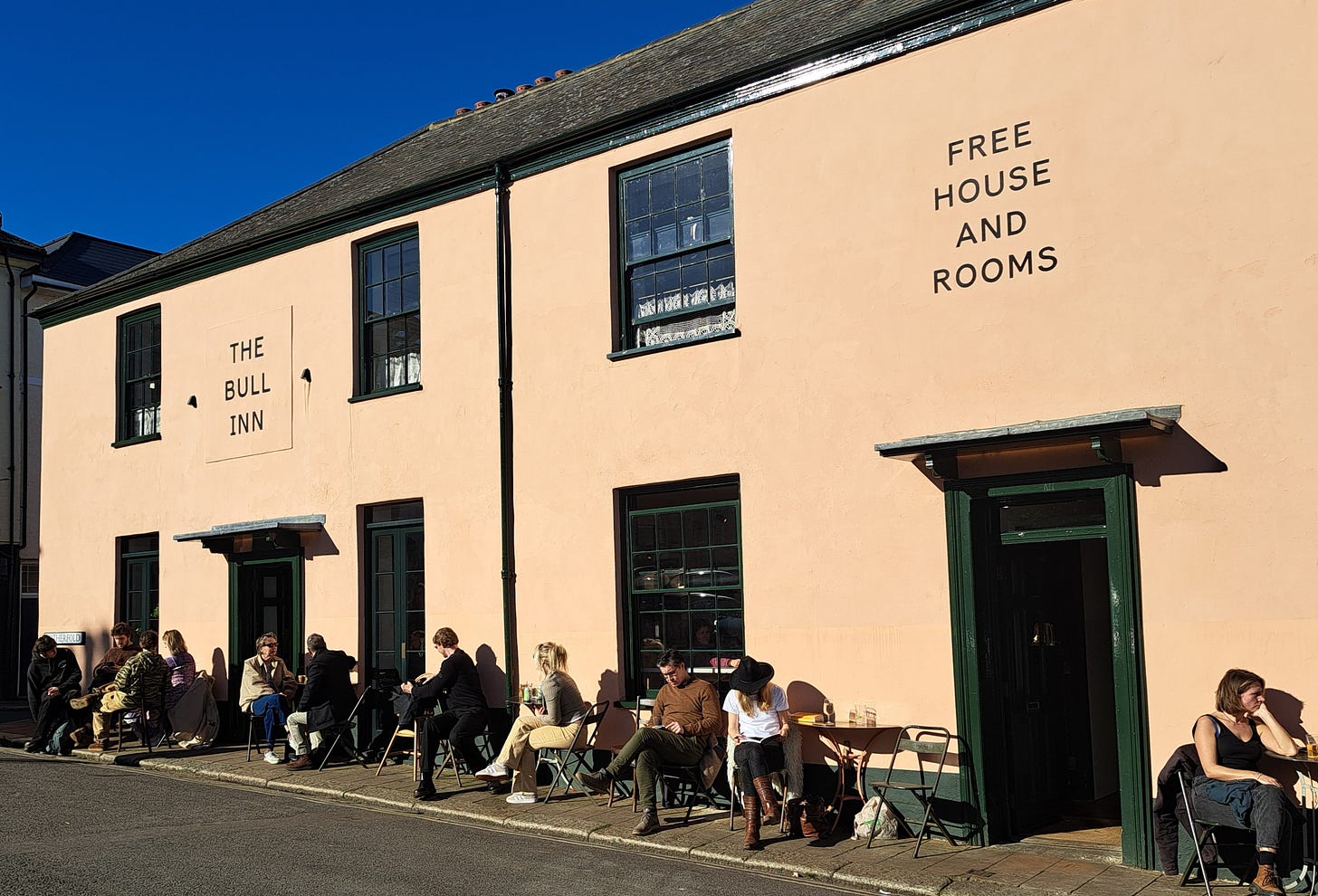

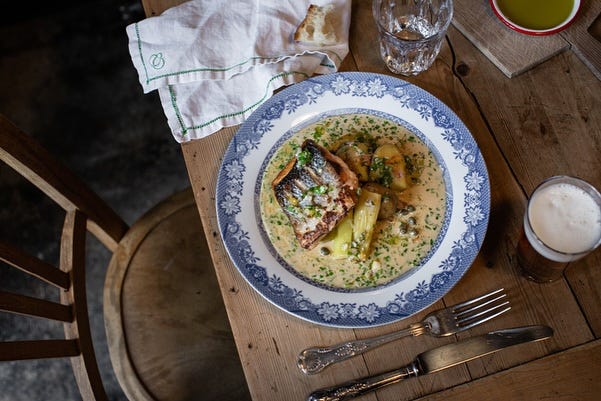
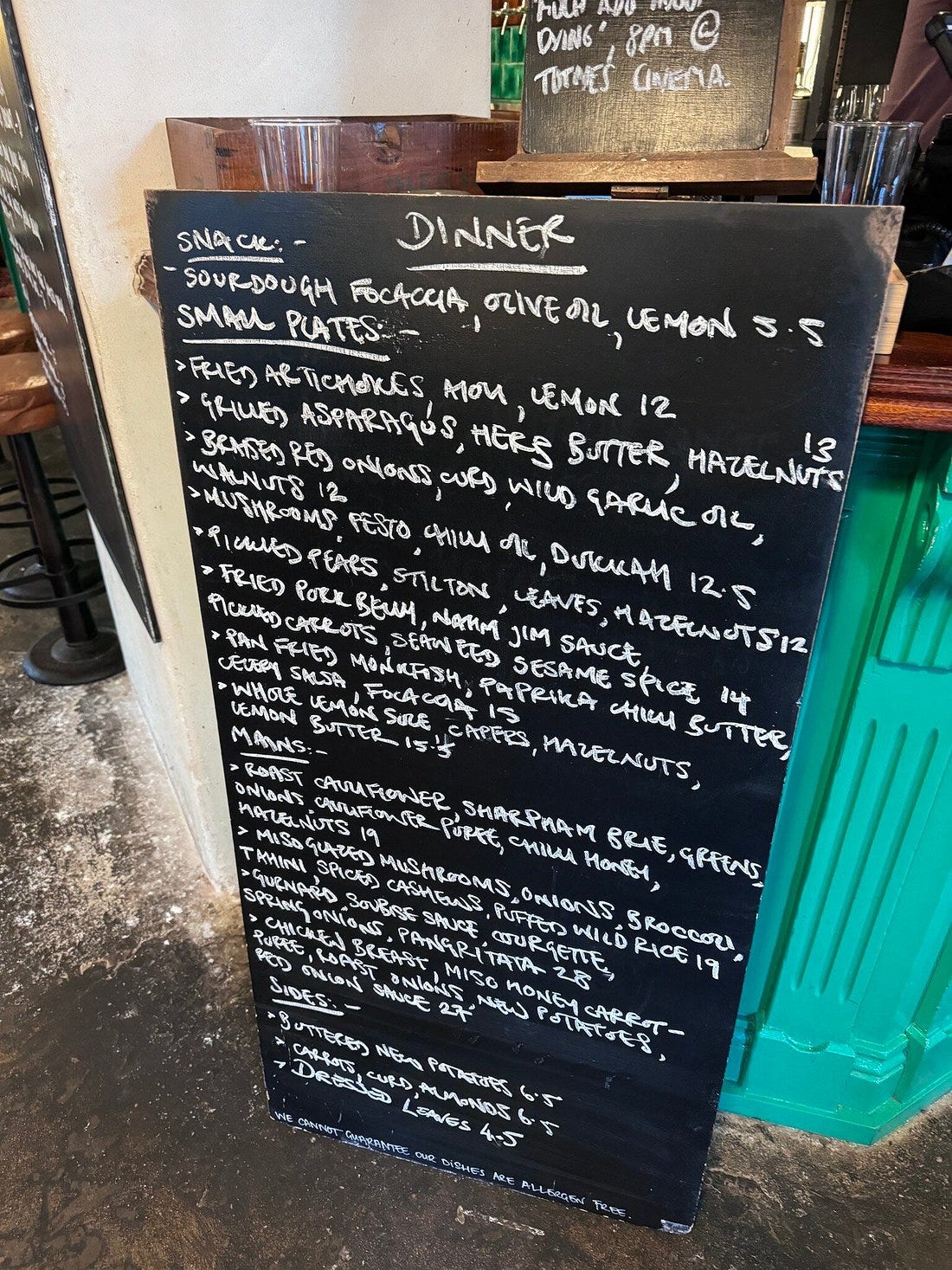

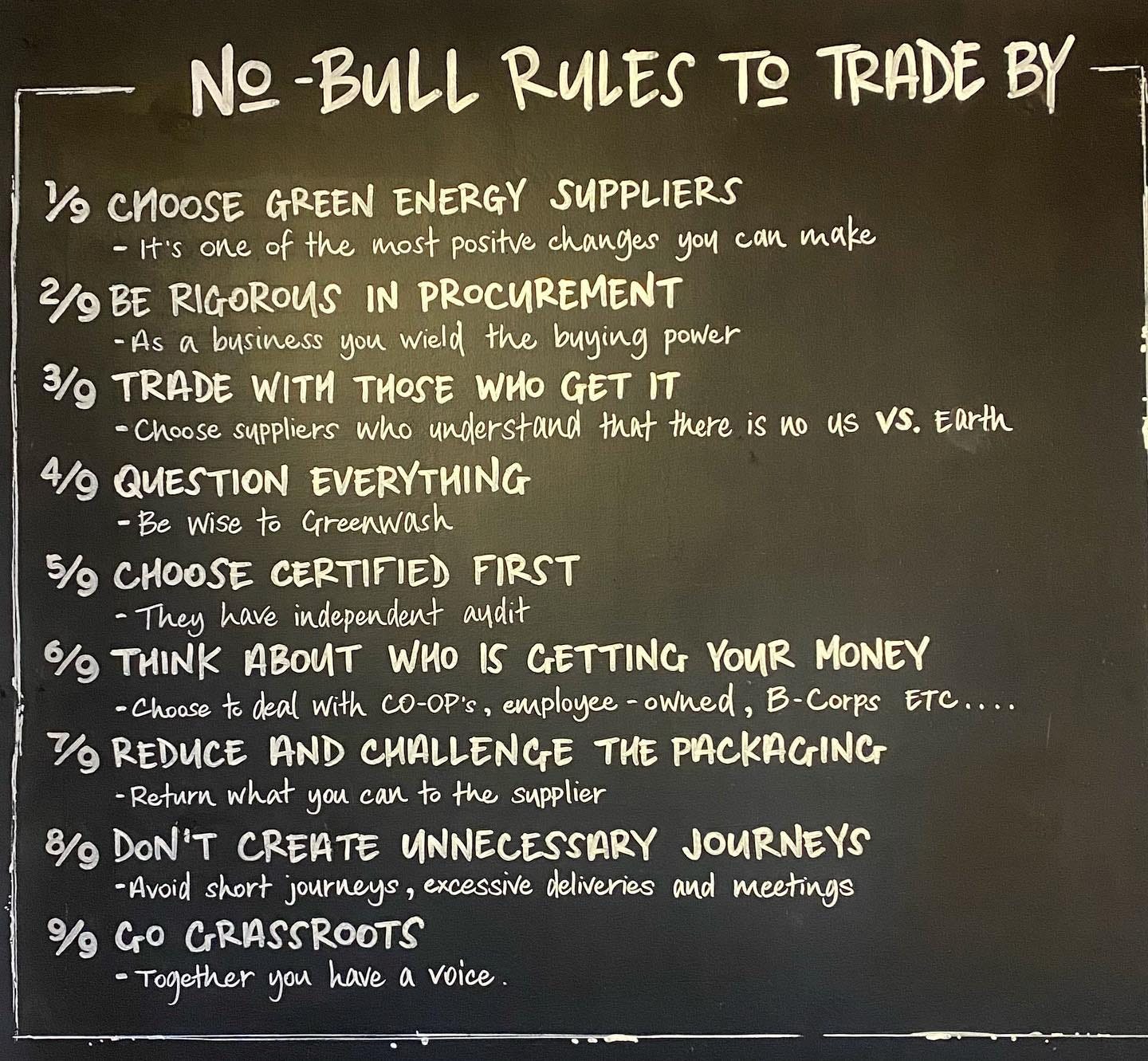
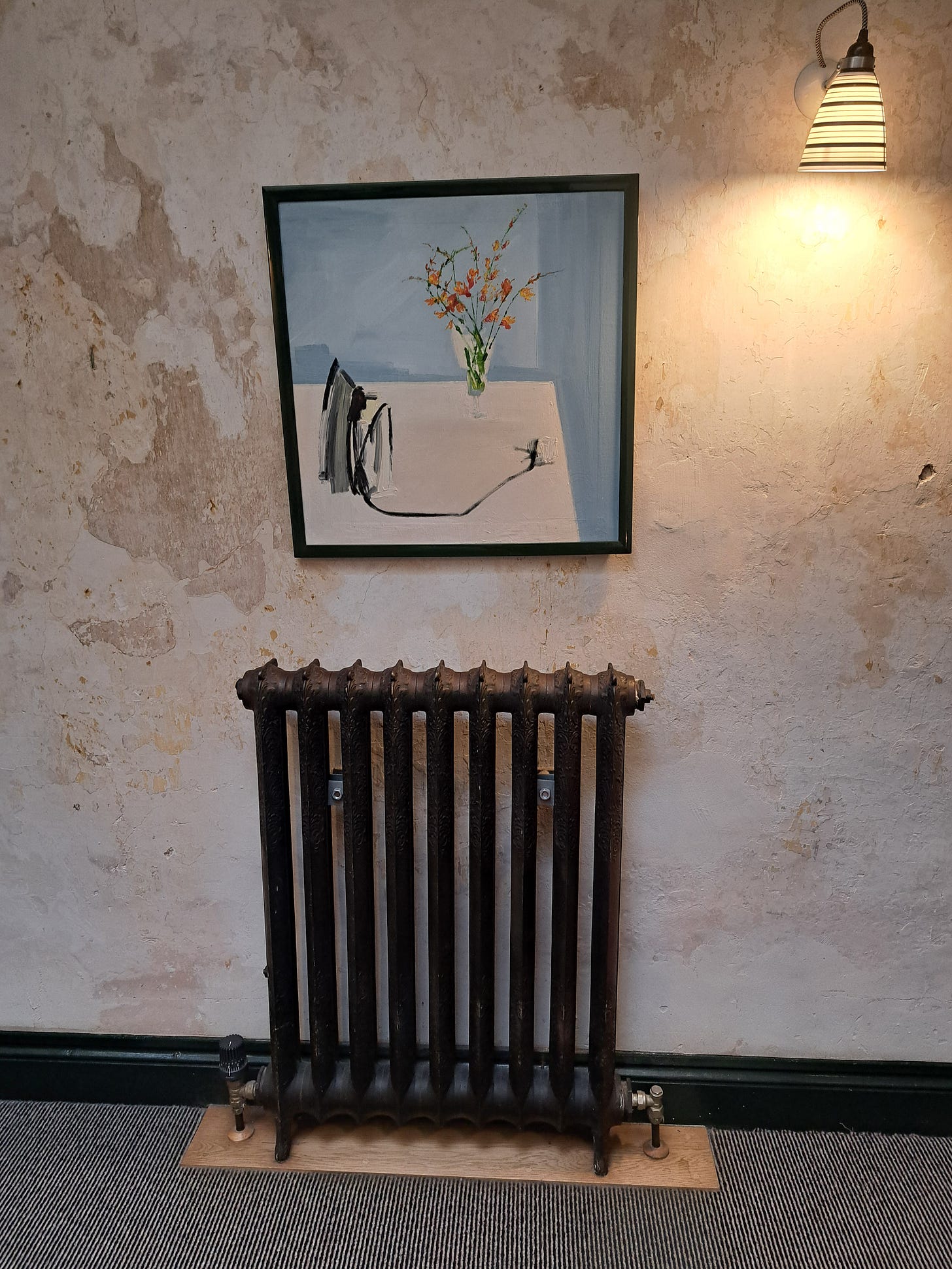

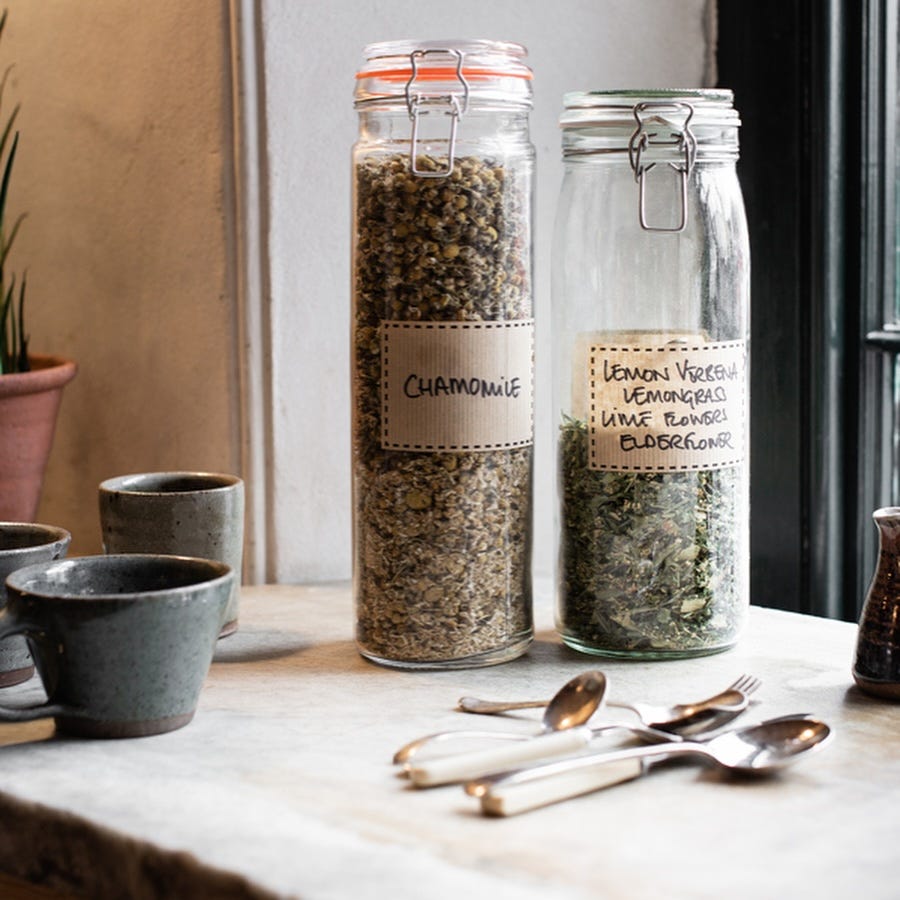


Fascinating read! Thanks for sharing, Cheryl 💐
What a fantastic business. Thanks for sharing Cheryl. I used to visit the Duke of Cambridge when I lived in London. I love how they have stuck to their principles and have built an eco-system around them.